Грег Иган - Distress
Здесь есть возможность читать онлайн «Грег Иган - Distress» весь текст электронной книги совершенно бесплатно (целиком полную версию без сокращений). В некоторых случаях можно слушать аудио, скачать через торрент в формате fb2 и присутствует краткое содержание. Жанр: Фантастика и фэнтези, на английском языке. Описание произведения, (предисловие) а так же отзывы посетителей доступны на портале библиотеки ЛибКат.
- Название:Distress
- Автор:
- Жанр:
- Год:неизвестен
- ISBN:нет данных
- Рейтинг книги:3 / 5. Голосов: 1
-
Избранное:Добавить в избранное
- Отзывы:
-
Ваша оценка:
- 60
- 1
- 2
- 3
- 4
- 5
Distress: краткое содержание, описание и аннотация
Предлагаем к чтению аннотацию, описание, краткое содержание или предисловие (зависит от того, что написал сам автор книги «Distress»). Если вы не нашли необходимую информацию о книге — напишите в комментариях, мы постараемся отыскать её.
Distress — читать онлайн бесплатно полную книгу (весь текст) целиком
Ниже представлен текст книги, разбитый по страницам. Система сохранения места последней прочитанной страницы, позволяет с удобством читать онлайн бесплатно книгу «Distress», без необходимости каждый раз заново искать на чём Вы остановились. Поставьте закладку, и сможете в любой момент перейти на страницу, на которой закончили чтение.
Интервал:
Закладка:
I started crawling forward on my hands and knees, screaming wordlessly, almost paralyzed by a vision of the ocean rushing over the sinking reefs, sweeping up bodies, propelling them inland, dashing them against the splintering ground. I glanced back and saw nothing but the placid tent village, still uselessly intact—but the whole island was roaring in my skull, the deluge could only be minutes away.
I stood again, ran for whole seconds despite the swaying stars, then landed heavily, splitting my stitches. Warm blood soaked the bandages. I rested, covering my ears, daring to wonder for the first time if it would be better to stop and wait to die. How far was I from the guyot? How far would the ocean reach in, even if I made it to solid ground? I groped at my notepad pocket, as if I could get a GPS fix, check a few maps, come to some kind of decision. I rolled onto my back and started laughing. The stars jittered into time-lapse trails.
I stood up, glanced over my shoulder—and saw someone running across the rock behind me. I dropped to my hands and knees, half voluntarily, but kept my eyes on the figure. Ve was dark-skinned and slender— but it wasn’t Akili, the hair was too long. I strained my eyes. It was a teenage girl. Her face caught the moonlight, her eyes wide with fear, but her mouth set in determination. Then the ground heaved, and we both fell. I heard her cry out in pain.
I waited—but she didn’t get up.
I started crawling back toward her. If she was injured, all I’d be able to do was sit with her until the ocean took us both—but I couldn’t keep going and leave her.
When I reached her, she was lying on her side with her legs jack-knifed, massaging one calf, muttering angrily. I crouched beside her and shouted, "Do you think you can stand?"
She shook her head. "We’d better sit it out here! We’ll be safe here!"
I stared at her. "Don’t you know what’s happening? They’ve killed the lithophiles!"
"No! They’ve been reprogrammed—they’re actively swallowing gas. Just killing them would be too slow—give too much warning!"
This was surreal. I couldn’t focus on her; the ground was juddering too hard. "We can’t stay here! Don’t you understand? We’ll drown!"
She shook her head again. For an instant, contradictory blurs of motion canceled; she was smiling up at me, as if I was a child afraid of a thunderstorm. "Don’t worry! We’ll be fine!"
What did she think would happen, when the ocean came screaming in? We’d just… hold each other up? One million drowning refugees would all link hands and tread water together?
Stateless had driven its children insane.
A fine moist spray rained down on us. I crouched and covered my head, picturing deep water rushing into the depressurized rock, blasting fissures all the way to the surface. And when I looked up, there it was: in the distance, a geyser fountained straight into the sky, a terrible silver thread in the moonlight. It was some hundred meters away—to the south—meaning that the path to the guyot was already undermined, and there was no hope of escape.
I lay down heavily beside the girl. She shouted at me, "Why were you running in the wrong direction? Did you lose your way?"
I reached over and gripped her shoulder, hoping to see her face more clearly. We gazed at each other in mutual incomprehension. She yelled, "I was on scout duty. I should have stopped you at the edge of the camp, but I thought you’d just go a little way, I thought you just wanted a better view for your camera."
The shoulder camera was still packed in my wallet; I hadn’t even thought of using it, turning it back on the camp as it was flooded, broadcasting the genocide to the world.
The gentle rain grew heavier for a second or two—but then subsided. I looked south, and caught sight of the geyser collapsing.
Then, for the first time, I noticed my hands trembling.
The ground had quietened.
Meaning what ? The stretch of rock we lay on had broken free of its surroundings, like an iceberg birthed screaming from a glacial sheet, and was floating in relative tranquility now—before the water rushed in around the edges?
My ears rang, my body was quivering—but I glanced up at the sky, and the stars were rock-steady. Or vice versa.
And then the girl gave me a shaken, queasy, adrenaline-drunk grin, her eyes shining with tears of relief. She believed that the ordeal was over. And I’d been warned not to think I knew better. I stared back at her wonderingly, my heart still pounding with terror, my chest constricted with hope and disbelief. I found myself emitting long, gasping sobs.
When I’d regained my voice, I asked, "Why aren’t we dead? The overhang can’t float without the lithophiles. Why aren’t we drowning?"
She rose and sat cross-legged, massaging her bruised calf, distracted for a moment. Then she looked at me, took the measure of my misunderstanding, shook her head, and patiently explained.
"No one touched the lithophiles in the overhang. The militia sent divers to the edge of the guyot, and pumped in primer to make the lithophiles degass the reef-rock just above the basalt. Water flooded in— and the surface rock at the center is heavier than water."
She smiled sunnily. "I look at it this way. We’ve lost a city. But we’ve gained a lagoon."
PART FOUR
29
The camp was in jubilant disarray. There were thousands of people out in the moonlight, checking each other for injuries, raising collapsed tents, celebrating victory, mourning the city—or soberly reminding anyone who’d listen that the war might not be over. No one knew for certain what forces, what weapons, might have been concealed far from the city, safe from the devastation of the center’s collapse—or what might yet crawl out of the lagoon.
I found Akili, unharmed, helping with the marquee which had fallen onto the water pumps. We embraced. I was bruised all over, my face was caked with blood, and my thrice re-opened wound was sending out flashes of pain like electric arcs—but I’d never felt more intensely alive.
Akili pulled free of me gently. "At six a.m., Mosala’s TOE will be posted on the nets. Will you sit up with me and wait?" Ve looked me in the eye, hiding nothing—afraid of the plague, afraid effacing it alone.
I squeezed vis arm. "Of course."
I went to the latrines to clean up. Mercifully, the sewage conduits remained open and the raw waste previously discharged hadn’t been forced back up to the surface by the compression waves of the quake. I washed the blood off my face, and then cautiously unbandaged my stomach.
The wound was still bleeding thinly. The cut from the insect’s laser ran deeper than I’d realized; when I bent over the washbasin, I could feel the two walls of flesh on either side of the gash—some seven or eight centimeters long—slide against each other, disconnected except at the ends. The burn had cauterized tissue all the way through the abdominal wall—and now the dead seam had split open.
I looked around; there was no one else in sight. I thought: This is not a good idea. But I’d already been pumped full of antibiotics against the risk of internal infection…
I closed my eyes and forced three fingers deep into the wound. I touched the small intestine, blood-warm not snake-cold, resilient, muscular and unslick beneath my fingertips. This was the part of me which had almost killed me—subverted by foreign enzymes, mercilessly wringing me dry. But the body is not a traitor: it only obeys the laws it must obey in order to exist at all.
Pain caught up with me, and I almost froze—I imagined spending my life as a Bonaparte, or a self-doubting Thomas—but I jerked my hand free and then leaned against the plastic barrel of the washbasin, punching the side.
Читать дальшеИнтервал:
Закладка:
Похожие книги на «Distress»
Представляем Вашему вниманию похожие книги на «Distress» списком для выбора. Мы отобрали схожую по названию и смыслу литературу в надежде предоставить читателям больше вариантов отыскать новые, интересные, ещё непрочитанные произведения.
Обсуждение, отзывы о книге «Distress» и просто собственные мнения читателей. Оставьте ваши комментарии, напишите, что Вы думаете о произведении, его смысле или главных героях. Укажите что конкретно понравилось, а что нет, и почему Вы так считаете.
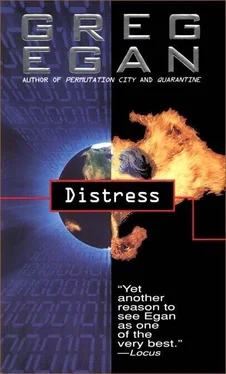

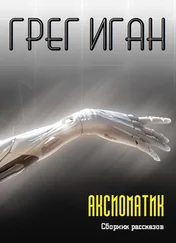
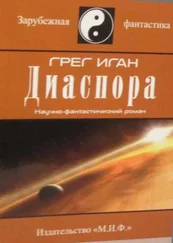
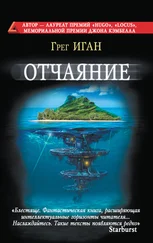
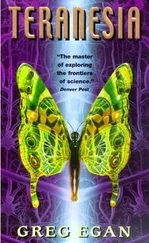
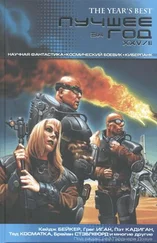


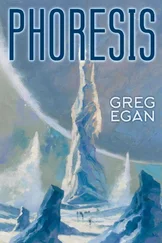
![Грег Иган - Рассказы [компиляция]](/books/419837/greg-igan-rasskazy-kompilyaciya-thumb.webp)
